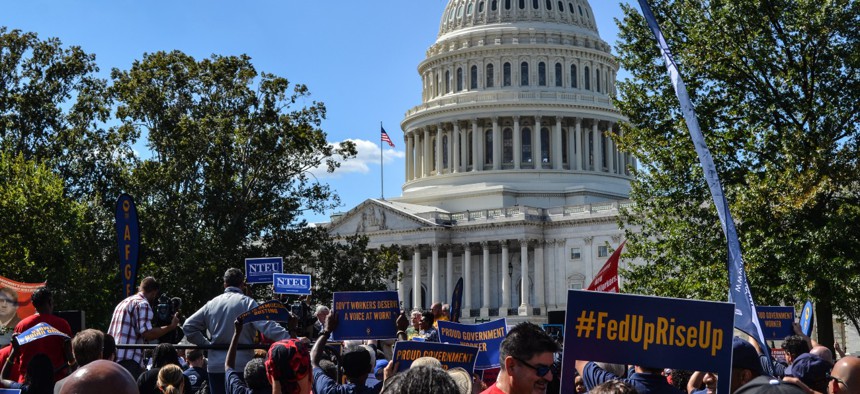
Federal employee union members rally near the Capitol in September 2019. Dan Riehl / AFGE
Labor Authority: Unions Can't Do 'Grassroots' Lobbying on Official Time
Although federal employee groups decried the decision, the Federal Labor Relations Authority stopped short of a conservative anti-labor organization's request to outlaw direct lobbying of lawmakers while on official time.
The Federal Labor Relations Authority on Wednesday said that union members at federal agencies can no longer do so-called “grassroots” lobbying while on official time, upending decades of precedent.
The 2-1 decision came in the form of a response to a request for a general statement of policy or guidance. Although the FLRA has traditionally resisted making general policy statements in favor of establishing precedent through individual labor-management disputes, the agency has recently reversed course in the face of an onslaught of such requests from the Trump administration.
But unlike the FLRA’s first foray into policy statements, which was at the behest of the Office of Personnel Management, Wednesday’s decision followed a request from the National Right to Work Legal Defense Foundation, a conservative anti-labor advocacy group. That organization asked the FLRA to outlaw the use of official time for any lobbying activities due to the Anti-Lobbying Act, a 1996 law that blocks federal funds from being used to lobby Congress or officials in the executive branch.
The FLRA stopped short of granting the National Right to Work Legal Defense Foundation’s request in full, finding that the Anti-Lobbying Act provides exceptions to the ban, provided Congress has given “express authorization” of the activity. And since federal labor law specifically provides that labor representatives at federal agencies are allowed to present the views of their union to Congress, the FLRA concluded that so-called “direct lobbying” can be done on official time.
But the FLRA ruled that “indirect” or “grassroots” lobbying, in which a labor representative encourages other people, including other union members, to contact their lawmakers to support or oppose legislation, is not expressly authorized by the federal labor-management relations statute, and thus should be ineligible for official time. In the agency’s decision, FLRA Chairwoman Colleen Duffy Kiko cited a 2005 Office of Legal Counsel opinion that suggested the Anti-Lobbying Act should bar the use of official time for grassroots lobbying, although “whether any particular activity would violate the act will depend on the specific facts.”
At the crux of the FLRA’s decision is the interpretation that “members of the public,” as envisioned by the 2005 Office of Legal Cousel opinion, include other union members. It is also the fundamental flaw of the decision, according to dissenting FLRA Member Ernest DuBester.
“Selectively quoting the memorandum, the majority concludes that this ‘grassroots’ lobbying would encompass ‘a union representative encouraging members of the public, including other union members, to pressure Congress,” DuBester wrote. “The problem is that the italicized words in the preceding sentence are the majority’s, and are not part of the Office of Legal Counsel’s memorandum. In fact, the 2005 memorandum never explicitly equates ‘members of the public’ with the union’s own members.”
DuBester noted that the FLRA under the George W. Bush administration agreed with his reading in a subsequent case, writing that “there is nothing in the [Office of Legal Counsel] memorandum or comptroller general case law it cites that equates federal employees represented by a union with ‘members of the public.’ ”
“On this point, the [FLRA] reasoned that ‘when a union is communicating with those whom it represents, it is dealing with persons with whom it has a special relationship—a relationship that distinguishes those persons from ‘members of the public,’” the dissent stated.
Duffy Kiko argued that reasoning is faulty, because when union members who have been encouraged to contact their lawmakers contact their lawmakers, the lawmakers will see them as a member of the public, not a union member.
“With respect to the views of individual union members who have been encouraged by their union to pressure Congress, or other government officials, under their own name, it is the individual member of the public, not the union representative who is making the presentation, and the views that government officials receive are presented as the public’s views, rather than the views of the labor organization,” Duffy Kiko wrote.
DuBester also took issue with the majority opinion, which suggested that the decision would bar unions from using official time to train employees on how to conduct direct lobbying of lawmakers.
“The question of whether the use of official time to engage in lobbying activities offends the [Anti-Lobbying] Act’s prohibitions is not answered by determining whether the lobbying constitutes ‘direct’ lobbying or ‘grassroots’ lobbying,” he wrote. “Rather, the determinative question is whether the activity in question is proscribed by the act to begin with. Here, the majority has not even attempted to explain how an award of official time to train union members to engage in lobbying activities as representatives of the union is prohibited by the act.”
In a statement to Government Executive, National Treasury Employees Union National President Tony Reardon said his union has appealed the FLRA’s ruling to the U.S. Court of Appeals for the D.C. Circuit.
“Although the FLRA rejected an outside anti-union group's blatant attempt to ban the use of official time for communications with Congress, we remain concerned that this decision’s vague new distinction between direct and indirect lobbying will result in a proliferation of disputes and negatively impact our ability to advocate to Congress on matters of importance to federal employees,” he said. “By declaring that official time for ‘indirect’ advocacy is not a topic that can be negotiated between labor organizations and federal agencies, federal employees may be restricted, for example, in how they educate their coworkers and encourage them to directly express their views to members of Congress and their staffs.”







